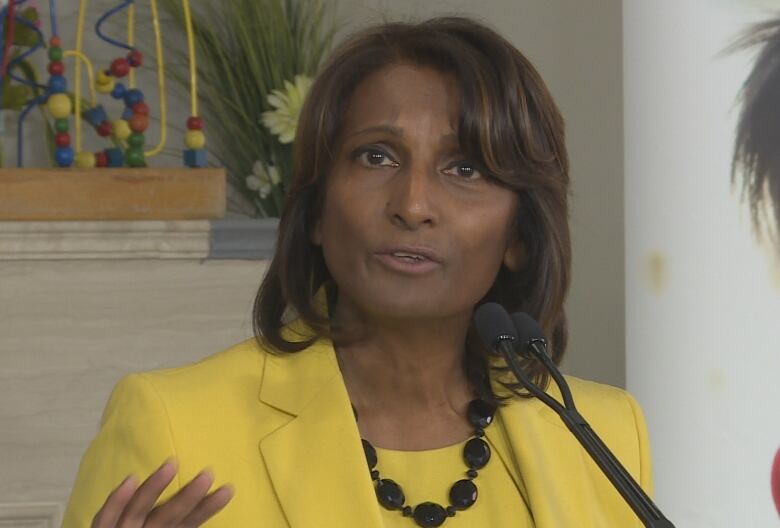Ontario will unveil 16,000 subsidized child-care spaces in the provincial budget

Ontario's provincial budget will include $200 million to create24,000 child-care spaces, 16,000 of which will be subsidized.
The spaces were announced in the 2016 throne speech, but the subsidies are new and the minister for that portfolio hinted that more parents may be able totap into those resources.
Indira Naidoo-Harris, the minister responsible for early years and child care, told reporters Wednesday that she would unveil a new framework governing child-care policy.
"We've got a renewed framework that we've been working on and part of that is absolutely looking at the subsidy model," shesaid.
'Asecond mortgage to pay for child care'
That's welcome news to families in Toronto.

In this city, parents pay an average of more than $2,000 a month to put kids younger than 18 months in daycare if they don't qualify for a subsidy.
"That's a second mortgage to pay for child care," said Carolyn Ferns, policy co-ordinator at the Ontario Coalition for Better Child Care. "So we're hoping that the government is willing to explore looking at affordability more broadly, because there's lots of families middle-income families who don't qualify for a subsidy but really face challenges in paying for child care."
You have to find a space. But then you have to be able to afford it.- Carolyn Ferns, policy co-ordinator, Ontario Coalition for Better Child Care
The coalition wants the province to create a subsidy model that would cap child-care costs at 10 per cent of a household's annual income.
"You have to find a space," said Ferns, who is also expecting her first child. "But then you have to be able to afford it."
Breaking down the costs
To put that in perspective, Toronto's median family household income sat at $75,270 in 2014, according to Statistics Canada. That means half of those families fall below that, while the other half sit above.
That household should qualify for a subsidy in the city of Toronto: they would pay a maximum of $48.20 per day or $964 during a month with 20 days of care.
At $102,058, families qualify for a subsidy that will cap their costs at $78.99 a day or about $1,579 in month with 20 weekdays.
That's assuming, of course, that there are subsidized spaces available.
In Toronto right now, there are about 37,000 licensed spaces in the city, which is only enough for some 31 per cent of the children. About eight per cent of families have their daycare fees subsidized by the city, but there's also a long waiting list to access the subsidized spots.
Waiting for more spaces
Mayor John Tory said before the announcement Wednesday that while he's hopeful the province will create more licensed child-care spaces, what the city needs most is more subsidized spaces.
He noted that in certain neighbourhoods there are daycares with vacancies, namely because people cannot afford the spots.
The shortage of child care and its high cost has limited the opportunities available to young parents, something that disproportionately affects women, the mayor said.
The city approved its own 10-year child-care plan Thursday, which will set a blueprint for what support they need from the province.

It's something, too, that can threaten the city's ability to attract young professionals.
Deirdre Matthews decided to stay home for an extra six months after she gave birth to her son, Paddy. The recent immigrant from Ireland has no family support system here and neither she nor her partner were able to find a spot in which to place their infant that they could afford.
"Without going back work, I'm forfeiting myself," she said. "I'm putting the Mom of me ahead of the me of me. And I know that comes part and parcel with having a baby, but also you need to be able to be yourself, develop your career or your livelihood."
"You still need to establish yourself as an independent person from your baby or your children, because once they flee you still need to have some sort of substance to your life."
With files from Alison Chiasson












_(720p).jpg)


 OFFICIAL HD MUSIC VIDEO.jpg)
.jpg)



























































































